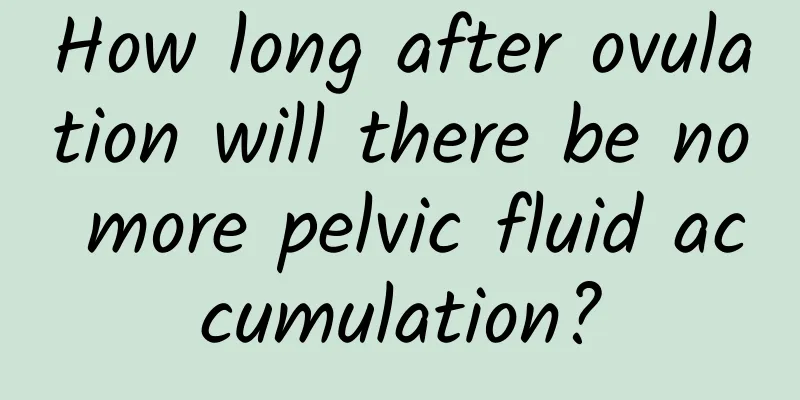How long after ovulation will there be no more pelvic fluid accumulation?

|
Mature women will ovulate, which is a normal phenomenon. However, some women will experience some discomfort after ovulation. So, how long will it take after ovulation for pelvic fluid to accumulate again? Pelvic effusion is the presence of inflammatory exudate in the pelvic cavity. It can occur after the endometrium becomes inflamed. The slightly viscous fluid exudates from the swollen cells of the endometrial tissue and is gradually wrapped by the surrounding tissue to form a cystic mass. Pelvic effusion is a common sign of chronic pelvic inflammatory disease, often caused by the failure to completely treat acute pelvic inflammatory disease, or the poor physical condition of the patient, and the prolonged course of the disease. It belongs to the category of "leucorrhea", "lower abdominal pain", "lower back pain" and so on in traditional Chinese medicine. The normal pelvic effusion value should be less than 10mm, which is also divided into pathological and physiological. Physiological pelvic effusion is generally within this range. After some special periods, part of the fluid will enter the pelvic cavity along the fallopian tube, and women will be prompted during ultrasound. Especially after menstruation and ovulation, the follicular fluid will enter the pelvic cavity, generally forming a small amount of pelvic fluid effusion, which can be clearly seen during scientific examination. Generally speaking, pelvic fluid effusion in this case will not affect the body and will disappear on its own after a period of time. This type of situation does not require treatment, and female friends do not need to worry too much. Not everyone can be diagnosed with pelvic effusion after ovulation. How long it takes for pelvic effusion to disappear after ovulation varies from person to person. The effusion must be more than 1.0 cm to be considered pathological effusion. Generally, physiological effusion can disappear on its own after 3 to 5 days, and there is no need to seek medical attention. However, if you find symptoms of pelvic effusion and the effusion has not disappeared within a week, you should go to the hospital for examination. |
<<: What kind of ring is suitable for patients with adenomyosis
>>: Can I still get pregnant with an ovarian cyst?
Recommend
Does congenital absence of vagina affect pregnancy?
Barren women refer to those women whose reproduct...
What are the methods of abortion during pregnancy? Let’s take a look
For most young people, the current life pressure ...
What are the clinical manifestations of cervicitis in women? Three clinical manifestations of cervicitis in women
Female friends should all know that the cervix is...
Will a large follicle be an ovarian cyst? What are the early symptoms of an ovarian cyst?
Can an oversized follicle be an ovarian cyst? Wha...
Will medical abortion cause infertility?
Will medical abortion cause infertility? 1. If yo...
Patients with cervical precancerous lesions should pay attention to self-care
Cervical precancerous lesions are the most common...
The main factors causing cervicitis
Cervicitis refers to inflammation of the uterine ...
Congenital absence of vagina
What is the authoritative knowledge about congeni...
How harmful are uterine fibroids to women?
Uterine fibroids are not unfamiliar gynecological...
The most authoritative diet for patients with cervical precancerous lesions
As the saying goes, disease comes from the mouth,...
Environmental Protection Agency plans to add 3 more substances to the list of controlled substances
Drinking water helps eliminate toxins from the bo...
What are the main symptoms of ectopic pregnancy?
What are the main symptoms of ectopic pregnancy? ...
Four major hazards of cervical erosion
Cervical erosion is a common disease in women wit...
History of STDs may increase risk of ectopic pregnancy
A woman’s history of sexually transmitted disease...
Can women with chronic cervicitis and HPV get pregnant? Patients with chronic cervicitis must pay attention to these before pregnancy
In life, it is not difficult to find that many wo...









